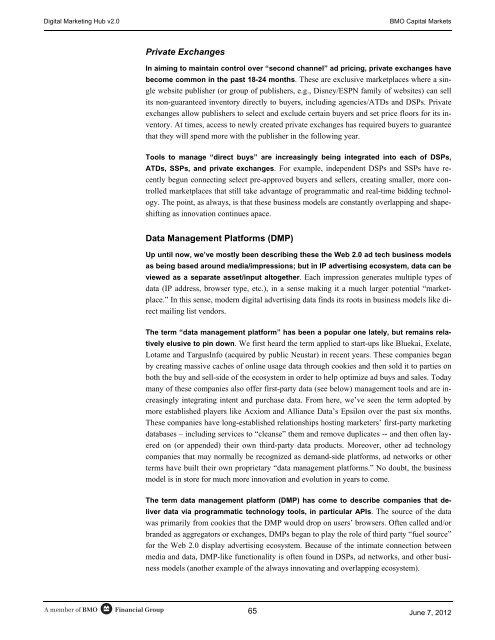DIGITAL MARKETING HUB v2.0 - AdExchanger
DIGITAL MARKETING HUB v2.0 - AdExchanger
DIGITAL MARKETING HUB v2.0 - AdExchanger
Create successful ePaper yourself
Turn your PDF publications into a flip-book with our unique Google optimized e-Paper software.
Digital Marketing Hub <strong>v2.0</strong><br />
BMO Capital Markets<br />
Private Exchanges<br />
In aiming to maintain control over “second channel” ad pricing, private exchanges have<br />
become common in the past 18-24 months. These are exclusive marketplaces where a single<br />
website publisher (or group of publishers, e.g., Disney/ESPN family of websites) can sell<br />
its non-guaranteed inventory directly to buyers, including agencies/ATDs and DSPs. Private<br />
exchanges allow publishers to select and exclude certain buyers and set price floors for its inventory.<br />
At times, access to newly created private exchanges has required buyers to guarantee<br />
that they will spend more with the publisher in the following year.<br />
Tools to manage “direct buys” are increasingly being integrated into each of DSPs,<br />
ATDs, SSPs, and private exchanges. For example, independent DSPs and SSPs have recently<br />
begun connecting select pre-approved buyers and sellers, creating smaller, more controlled<br />
marketplaces that still take advantage of programmatic and real-time bidding technology.<br />
The point, as always, is that these business models are constantly overlapping and shapeshifting<br />
as innovation continues apace.<br />
Data Management Platforms (DMP)<br />
Up until now, we’ve mostly been describing these the Web 2.0 ad tech business models<br />
as being based around media/impressions; but in IP advertising ecosystem, data can be<br />
viewed as a separate asset/input altogether. Each impression generates multiple types of<br />
data (IP address, browser type, etc.), in a sense making it a much larger potential “marketplace.”<br />
In this sense, modern digital advertising data finds its roots in business models like direct<br />
mailing list vendors.<br />
The term “data management platform” has been a popular one lately, but remains relatively<br />
elusive to pin down. We first heard the term applied to start-ups like Bluekai, Exelate,<br />
Lotame and TargusInfo (acquired by public Neustar) in recent years. These companies began<br />
by creating massive caches of online usage data through cookies and then sold it to parties on<br />
both the buy and sell-side of the ecosystem in order to help optimize ad buys and sales. Today<br />
many of these companies also offer first-party data (see below) management tools and are increasingly<br />
integrating intent and purchase data. From here, we’ve seen the term adopted by<br />
more established players like Acxiom and Alliance Data’s Epsilon over the past six months.<br />
These companies have long-established relationships hosting marketers’ first-party marketing<br />
databases – including services to “cleanse” them and remove duplicates -- and then often layered<br />
on (or appended) their own third-party data products. Moreover, other ad technology<br />
companies that may normally be recognized as demand-side platforms, ad networks or other<br />
terms have built their own proprietary “data management platforms.” No doubt, the business<br />
model is in store for much more innovation and evolution in years to come.<br />
The term data management platform (DMP) has come to describe companies that deliver<br />
data via programmatic technology tools, in particular APIs. The source of the data<br />
was primarily from cookies that the DMP would drop on users’ browsers. Often called and/or<br />
branded as aggregators or exchanges, DMPs began to play the role of third party “fuel source”<br />
for the Web 2.0 display advertising ecosystem. Because of the intimate connection between<br />
media and data, DMP-like functionality is often found in DSPs, ad networks, and other business<br />
models (another example of the always innovating and overlapping ecosystem).<br />
A member of BMO<br />
Financial Group<br />
65<br />
June 7, 2012


